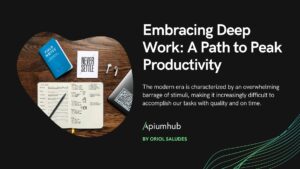Table of Contents
As we venture into the second part of our exploration into mastering Deep Work, we not only continue unraveling crucial guidelines but also unveil a formula designed to print these key principles into your memory. Join us on this journey as we delve deeper into the strategies that define peak productivity and discover the mnemonic key to keeping them at the forefront of your work philosophy. Let’s continue our quest to transform the way we work and maximize the impact of our efforts.
What steps can we take to enhance our performance and excel in our endeavors? (continuation)
A Path to Peak Productivity: Steps to Enhance Your Performance
- Deep work
Work for a sufficient number of hours, but with utmost intensity. The human brain can sustain about 4 hours of high-intensity work per day. Therefore, attempting to extend beyond these hours, especially into the evening, is not worthwhile. Productivity tends to decline, and the risk of introducing errors increases, outweighing the potential for creating valuable content. Dedicate 4 to 5 hours per day to deep work, five days a week — a formula that can yield substantial and impactful results.
- Batching shallow work
Allocate specific time slots in your schedule for shallow work tasks, such as checking emails and responding to Slack messages. Grouping these activities in a batch allows you to address them efficiently without disrupting your focus during deep work sessions. This strategic approach ensures that you maintain concentration on more intensive tasks while still addressing necessary, but less cognitively demanding, responsibilities.
- Shutdown complete
The brain requires rest to allow the subconscious to work in the background. The “shutdown complete” is crucial: conclude the day by reviewing tasks, jotting them down in a list, and documenting pending items with potential solutions. This practice signifies the end of the workday, freeing the mind from ongoing mental processes of what needs to be done. It facilitates rest, ensuring that when you work, you do so with intensity. This cycle of intensity and rest is an essential and impactful practice.
- The attention residue concept
Working in a state of semi-distraction, such as checking email from time to time, can have a detrimental impact on performance. While seemingly harmless, these quick checks introduce new concerns, creating mental residue when issues cannot be immediately addressed. This holds even before bedtime—avoid checking emails before sleep. The unresolved issues linger in your mind, disrupting the ability to rest properly.
- Rest
Similar to physical jobs, adequate rest and quality sleep are essential to prepare for a productive day of hard work.
- Embrace boredom
Just as the body requires rest, the mind also needs moments of boredom, free from constant distractions like screens. Resist the urge to fill dull moments with easy distractions like phones.
- Sharpen the Saw: A Commitment to Continuous Growth
Embrace the philosophy of “Sharpen the Saw” from the “7 Habits of Highly Effective People“:
- Never Stop Growing: Dedicate yourself to continuous personal and professional growth.
- Never Stop Reading: Cultivate a habit of perpetual learning through constant reading and acquiring new knowledge.
- Establish rituals
Define specific places, timings, and formats for your tasks, accompanied by clear rules. This ensures you don’t second-guess when and how to approach your responsibilities. Rituals provide structure and eliminate unnecessary decision-making, promoting efficiency and focus.

From the book, there is a catchphrase we should tattoo in our brains:
To produce at your peak level you need to work for extended periods with full concentration on a single task free from distraction.
Grouping challenging yet crucial intellectual tasks into extended, uninterrupted sessions.
Law of Productivity: High-quality work produced = (Time Spent) x (Intensity of Focus)
Conclusion
In the tumult of distractions, Cal Newport’s “Deep Work” illuminates a path to true productivity. The clear delineation between deep and shallow work, strategic principles, and a commitment to undivided focus offer a powerful antidote to the modern challenge of constant distraction. Embracing deliberate practices, like the “shutdown complete” and attention residue awareness, fortifies our ability to achieve peak productivity. Through deep work, strategic principles, and a commitment to continuous improvement, we can navigate the digital age and cultivate a reservoir of focused, high-quality output.
Author
-

Experienced Full Stack Engineer with a demonstrated history of working in the information technology and services industry. Skilled in PHP, Spring Boot, Java, Kotlin, Domain-Driven Design (DDD), TDD and Front-end Development. Strong engineering professional with a Engineer's degree focused in Computer Engineering from Universitat Oberta de Catalunya (UOC).
View all posts
More to Explore











